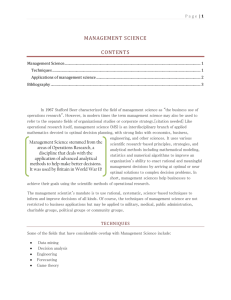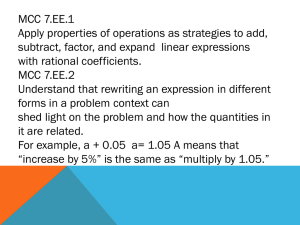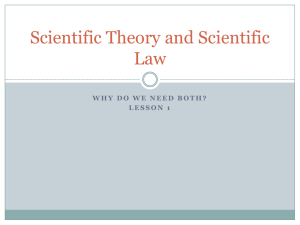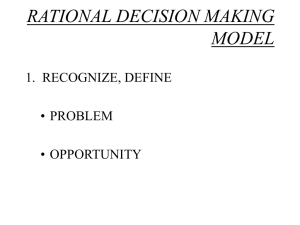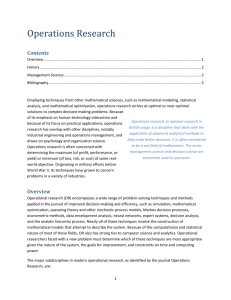Characteristics of Science
advertisement
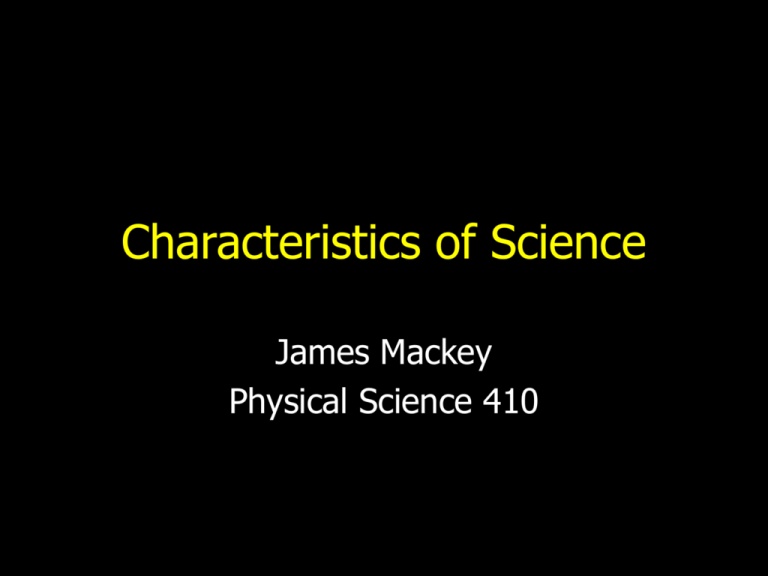
Characteristics of Science James Mackey Physical Science 410 Where am I going with thias material? •1 To show the connection between Christianity and modern science •2 To look at certain characteristics that are hallmarks of what we today call science Ancient World Most societies pantheistic – God/nature blended together – Gods are not to be studied/investigated Duane Warden addressed this worldview earlier thissemester •Ancient, Pagan Worldview:(recall previous references to the Enuma Elish -Babylonian Creation Myth •Conflict a part of creation: •gods are capricious •world is antagonistic to man •man must placate or appease gods •magic and ritual vital to this task •No purpose or meaning in universe •man is incidental in the scheme of things Greeks Many believed planets were living beings influencing man’s life. Great astronomer Ptolemy wrote book called Tetrabiblios (the bible of astrology) While Greeks made many advances in thinking about the universe, they were handicapped by almost exclusive deductive reasoning •German physicist who studied nuclear processes in stars and also worked with Heisenberg and others on German atomic projects in WWII. After the war, became a strong pacifist and religious thinker – received a Templeton Prize in 1989, died in 2007. “Matter in the Platonic sense, which must be ‘prevailed upon’ by reason, will not obey mathematical laws exactly : matter which God has created from nothing may well strictly follow the rules which its Creator has laid down for it. In this sense I call modern science a legacy, I might even have said a child, of Christianity.” •C.F. von Weizsacker, p163 Eastern Cultures • China – Despite tremendous technical achievements superior to western culture • gunpowder, magnetism, block printing, etc – Science as we know it never develops • Eastern cultures in general – fatalistic (man is powerless before fate) Why the Chinese never developed Modern Science “There was no confidence that the code of Nature’s Laws could be unveiled and read, because there was no assurance that a divine being, even more rational than ourselves, had ever formulated such a code capable of being read. The Chinese did sense order in nature, but decided it was a necessity inscrutable to the human mind. It was not an order ordained by a rational personal being and hence there was no guarantee that other rational beings would be able to spell out in their own earthly language the pre-existing divine code of laws...” •Joseph Needham, p327 Jewish View • Primarily teleological • Nature and the Divine are distinct entities • Nature is a creation of God and thus subordinate in character to God • Since the world is only a created entity, it can be freely studied and dissected Richard H Bube, prof of materials science at Stanford University • “The presuppositions that make science possible are not derivable from the scientific enterprise itself; they are, however, a direct consequence of the Judeo-Christian biblical world view. It is no more possible to do science without a faith that a rational understanding of the world is a possible goal for finite minds, than it is to enter into religion without the faith that God exists.” – Bube •Stanley L. Jaki, (1924 – 2009) was a Benedictine priest and Distinguished Professor of Physics at Seton Hall University, New Jersey since 1975. He was a leading thinker in the philosophy of science, theology, and on issues where the two disciplines meet and diverge. He authored more than two dozen books. “The essence of paganism, old or new, is that the universe is eternal, that its motions are without beginning and without end… …Belief in creation out of nothing, and in time is the very opposite of paganism. Once that belief became a widely shared cultural consensus during the Christian Middle ages, it became almost natural that there should be arise the idea of inertial motion” Jaki (emphasis mine) •"As I try to discern the origin of that conviction [that the universe is ordered], I seem to find it in a basic notion discovered 2000 or 3000 years ago, and enunciated first in the Western world by the ancient Hebrews: namely, that the universe is governed by a single God, and is not the product of the whims of many gods, each governing his own province according to his own laws. This monotheistic view seems to be the historical foundation for modern science." • Melvin Calvin, Nobel prize-winning biochemist (Pearcey and Thaxton, p. 25) • (1911-1997) Director of the Laboratory of Chemical Biodynamics Group in the Lawrence Radiation Laboratory since 1946. Nobel Laureate in Chemistry in 1961 The exclusion of any religious influence on scientific thinking is a rather recent situation developing primarily in the late 19th and early 20th centuries Isaac Newton arguably one of the greatest and most influential scientist ever, wrote far more religious writings than scientific writings •Sir Isaac Newton (1643 – 1727) was an English physicist, mathematician, astronomer, natural philosopher, alchemist, and theologian who is considered by many scholars and members of the general public to be one of the most influential scientists in history. His 1687 publication of the Philosophiæ Naturalis Principia Mathematica (usually called the Principia) is considered to be among the most influential books in the history of science. Michael Faraday, one of the greatest experimentalists of all time, and discoverer of the electromagnetic interaction as well as Benzene, was a devout believer. He was a member of a NT group in England referred to as Sandemanians* (after Robert Sandeman, the group’s leading thinker on primitive Christianity. •*Probably in the same sense as “Campbellite” •Michael Faraday, (1791 – 1867) was an English chemist and physicist (or natural philosopher, in terminology of the time), who contributed to the fields of electromagnetism and electrochemistry. •Faraday was highly religious; he was a member of the Sandemanian Church, a Christian sect founded in 1730 which demanded total faith and commitment. Biographers have noted that "a strong sense of the unity of God and nature pervaded Faraday's life and work. “To do physics today, one need not be western, one need not even be a Christian. Science or physics has its highly developed and well proven techniques - theoretical and experimental. Such techniques remain universal even if their origin shows some special connection with Christianity. …. •…...But they require a philosophical and ethical underpinning if the purely quantitative results of physical science are to be integrated into the broader human context.” •Jaki •Other well known devout scientists •Nicolas Copernicus (1473-1543) •Johannes Kepler (1571-1630) •Francis Bacon (1561-1626) •Blaise Pascal (1623-1662) •Robert Boyle (1627-1691) •Nicolaus Steno (1638-1686) •Lord Kelvin [William Thomson] (1824-907) •James Clerk Maxwell (1831-1879) •Gregor Mendel (1822-1884) •Louis Pasteur (1822-1895) •Timothy Ferris (astronomer and emeritus professor at the University of California, Berkeley is the author of 12 books, three documentary films, including the one referenced below, and producer of the Voyager phonograph recording Science author Timothy Ferris, in a PBS special “The Creation of the Universe” made the following comments: •“Religion and Science are sometimes depicted as if they were opponents, but science owes a lot to religion. Modern science began with the rediscovery, in the Renaissance, of the old Greek idea that nature is rationally intelligible. •But science from the beginning incorporated another idea, equally important, that the universe is really a uni-verse, a single system ruled by a single set of laws. And science got the idea from the ... belief in one God...” •“I’m not saying that you have to believe in God in order to do science. Atheists and agnostics have won Noble Prizes, as have Christians and Jews, and Hindus, Muslims and Buddhists. •But modern scientific research, especially unified theory, testifies to the triumph of the old idea that all creation might be ruled by a single and elegantly beautiful principle.” In the same special, astronomer Allen Sandage, commenting on the scientific fact of the “Big Bang” stated... “If there ever was a creation event, it had to have a cause. This was Aquinas ‘ whole question (one of the 5 ways he tried to prove the existence of God). If you can find the first effect, you have, at least, come close to the first cause, which to Aquinas was God…… •Allen Sandage was an assistant to Edwin Hubble. His research has been in stellar astronomy and observational cosmology. He worked with Martin Schwarzschild, and has worked on calibrating all of the “standard candles” used is astronomical distance measurements. He has authored more than 75 technical papers. He has written and commented on religious beliefs and science. …What do astronomers say? As astronomers you can’t say anything except, ‘Here is a miracle, what seems --- what seems almost supernatural ... Can you finally find the answer ‘Why is there something instead of nothing?’ No, you cannot, not from within science. But it still remains an incredible mystery: Why is there something instead of nothing?” •Science writer Loren Eiseley reluctantly concludes in his book Darwin’s Century that: •"In one of those strange permutations of which history yields occasional rare examples, it is the Christian world which finally gave birth in a clear articulate fashion to the experimental method of science itself." Eiseley, Loren, Darwin’s Century •Eiseley, Loren, Darwin’s Century, (Doubleday Anchor Books,NY,1961), page 62 •Two approaches to dealing with questions of natural law and nature in human thinking: •Deductive •Inductive •Deductive Reasoning •general principles • •1 • Grand Scheme of Things 2 3 specific observations 4 •Inductive Reasoning • specific observations •1 2 3 •Grand Scheme of Things • general principles 4 •In general the hallmark of modern science is dominantly inductive reasoning •Historically deductive reasoning has been the preferred mode of analysis Greeks elevated deductive reasoning to a very high plane •(Rodin’s statue The Thinker) •A quotation from Plato shows the Greek view •“The physical world around us and all activity within it are mere illusions, like shadows in a cave. Truth lies beyond our immediate view. It is the philosopher’s task to find truth, but he cannot do this by extrapolating directly from everyday observations, just as the prisoners in the cave cannot arrive directly at the idea of colors from the black shadows they have always seen. The method must be deduction from abstract principles, not induction from experience; one must go from the general to the specific and not the other way around” •Plato (emphasis mine) •Growth of inductive thinking •Arabic ascendancy ~ (700 – 1200 AD) •Roman practicality •Galileo and experimental science •Inductive reasoning and analysis of complicated systems works by subdivision into smaller parts •Logical fallacy of modern science •Quoting Philosopher David Hume: •David Hume (1711 – 1776) was a Scottish philosopher, economist, historian and a key figure in the history of Western philosophy and the Scottish Enlightenment. •“The utmost effort of human reasoning is to reduce the principles productive of natural phenomena to a greater simplicity, and to resolve the many particular effects into a few general causes, by means of reasoning from analogy, experience, and observation…... •…But as to the causes of these general causes we should in vain attempt their discovery; nor shall we ever be able to satisfy ourselves of any particular explication of them. These ultimate springs and principles are totally shut up from human curiosity and inquiry.” •David Hume (emphasis mine) •50 blonde students…. •Logical proof •pragmatic - “if it works, use it!” What is Science? • Definitions: (from simple to ridiculous) – “Science is what scientists do when they’re working…” – “…a systemized body of facts….” •We will try to describe the nature of science from some of it’s characteristics rather than attempt to give a single, concise, universally applicable definition •. As always we adhere to Abelard's 12th century dictum "Truth cannot be contrary to truth. The findings of reason must agree with the truths of scripture, else the God who gave us both has deceived us with one or the other“. •Peter Abelard 1079-1142 was a medieval French scholastic philosopher, theologian and preeminent logician. He was also a composer. His affair with and love for Héloïse d'Argenteuil has become legendary yes Experimenta l validation by Peers no Peer review System Formal Publication Intuition Others work •Intuition Others work Serendipity ? Serendipity ? ? * revise the idea no revise Exp. Collect more data Communic ate with Peers Discuss with Peers Devise an Exp. procedure to test (A) the idea revised experiment Perform Experiment Collect Data Ask A Question yes reword question Collect & analyze new data Analyze/Interprete Data no no Continued Reevaluation by Peers no ** reinterpret the idea Peer Review Re submit Paper Does not validate Re-enter at (A) yes validates Idea yes Drop the Idea no Simplified Scientific "Method" (many internal feedbacks are omitted) Characteristics of Scientific Inquiry • • • • • • • • • Science is…… 1. based on observation and experimentation 2. mathematical and quantitative 3. naturalistic 4. based on models of nature 5. limited 6. dynamic 7. amoral 8. rational Characteristics of Scientific Inquiry • • • • • • • • • Science is…… 1. based on observation and experimentation 2. mathematical and quantitative 3. naturalistic 4. based on models of nature 5. limited 6. dynamic 7. amoral 8. rational 1. The beginning of science is observation • “The fundamental character of any science is that it ‘investigates’..By investigation I mean a deliberate, planned, devised way of getting data beyond the ordinary experience of men………... •.…Science begins by additions to ordinary experience and gradually moves farther and farther away from the field of general experience. Science uses deliberate, planned effort to observe and measure what men ordinarily don’t see and hear.” •Adler (emphasis mine) •A humorous(?) story that illustrates this.. •A carpenter, a school teacher, and scientist were traveling by train through Scotland when they saw a black sheep through the window of the train. "Aha," said the carpenter with a smile, "I see that Scottish sheep are black." "Hmm," said the school teacher, "You mean that some Scottish sheep are black." "No," said the scientist glumly, "All we know is that there is at least one sheep in Scotland, and that at least one side of that one sheep is black." This type of observation requires effort and training to do properly.. • “This is not work for the untutored imagination. It may be an art, but it is one whose exercise requires stiff training ….theoretical physicists have to be taught their trade and cannot afford to proceed by genius alone” • Toulmin Observation may be the beginning of science, but it is NOT the end. Observation by itself is not enough. • “…One might manipulate experimental apparatus for a lifetime, and accumulate all the observations one cared to, without ever spotting what form the law should take. For many centuries, indeed, scientists were within striking distance, but failed to discover it (Snell’s Law). Ptolemy, about 100 AD had already made many important observations on the subject.” Toulmin •In about AD 150, Claudius Ptolemy gave the following measured values for the angle of incidence 1 and the angle of refraction 2 for a light beam passing from air to water •This data illustrates Snell’s Law and can be used to calculate nwater , though Ptolemy did not recognize the relationship. •Average value = 1.31 1 10° 20° 2 8° 15° 30’ 1 50° 60° 2 35° 40° 30’ 30° 40° 22° 30’ 29° 70° 80° 45° 30’ 50° Characteristics of Scientific Inquiry • • • • • • • • • Science is…… 1. based on observation and experimentation 2. mathematical and quantitative 3. naturalistic 4. based on models of nature 5. limited 6. dynamic 7. amoral 8. rational 2. Science is Quantitative & Mathematical • One of the major developments in science was the move to quantitative/mathematical procedures • Aristotle did not believe mathematics was the method of natural science • Galileo is credited as one of the earliest scientists to recognize the importance of mathematics •In one of his dialogues, Galileo writes... •“Philosophy is written in that vast book…the universe…It is written in mathematical language, and the letters are triangles, circles, and other geometrical figures, without which it is humanely impossible to comprehend a single word.” •Galileo The language of science is mathematical for several reasons • conciseness • aesthetics • universality •Newton’s Law of Gravitation •Every object in the universe with mass attracts every other object with mass with a force that is proportional to the product of the two masses and inversely proportional to the square of the distance between their centers GM 1M 2 F 2 D • Considerable economy in expression - much simpler to write or read • Aesthetically more pleasing • Universally understandable – same equation in French, Russian, German, etc – graduate language exam Characteristics of Scientific Inquiry • • • • • • • • • Science is…… 1. based on observation and experimentation 2. mathematical and quantitative 3. naturalistic 4. based on models of nature 5. limited 6. dynamic 7. amoral 8. rational 3. Science is Naturalistic • Science deals only with natural categories • Only what is perceptible with natural senses • Cannot deal with non-natural or supernatural explanations •“Science is a way of knowing. It is a way of knowing by sense interaction with the world. There may be other ways of knowing or there may not. This question is not settled by science, which simply asserts that everything that can be known by sense interaction with the world (seeing, hearing, feeling, smelling, tasting - and the many sophisticated ways in which machines and instruments extend these basic sense impressions) is in the domain of scientific knowledge.” •Bube (emphasis mine) •Philosophical Scientism •The only questions that are to be associated with verifiable or valid knowledge are the questions that science can answer…. •The questions that science cannot answer are either not answerable or answerable only by opinion. •In an article “The Evolution of Life”, biologist H. Mehlberge wrote... •“There is nothing in the nature of the method of science which could prevent it from being applicable in principle to any problem that could be settled by any method whatsoever… ...The universality of science consists in the fact that problems unsolvable by the scientific method are either indeterminate or answerable by false statements only. In other words scientifically unsolvable problems have no solution and are therefore unsolvable by any non-scientific method as well.” Mehlberge •i.e. science is the only path to knowledge Characteristics of Scientific Inquiry • • • • • • • • • Science is…… 1. based on observation and experimentation 2. mathematical and quantitative 3. naturalistic 4. based on models of nature 5. limited 6. dynamic 7. amoral 8. rational 4. Science is Based on Models as Representations of Nature • Real physical systems are too complicated to solve exactly • Usually work with a model that “represents” nature • Not “literal descriptions” of the world, but “serious” attempts to produce a manageable picture of nature in a scientific framework “No physicist or engineer ever solves a real problem. Instead she creates a model of the real problem and solves this problem. This model ... must be simple enough to be solvable, and it must be realistic enough to be useful...” •R.J.Sciamanda, Quantum Vol 7 No 2, p45, Nov/Dec 1966 • Apply Newton’s Law to the motion of 2 particles •Solve 2 simultaneous D.E. • Real, physical system ~ 1025 particles •cannot solve 1025 simultaneous D.E. • Only problems we can solve exactly are ones---- we create, i.e. a “model” of the problem • Consider the mathematical nature of… • physics as contrasted with biology • physics chicken = point sphere • biologist chicken = feathers, feet, etc. • Must never forget that we solve a “model” ---of a natural system and not the system itself! •The Sky is Blue •Electromagnetic scattering cross-section for particles in the atmosphere (long approx.) 4 6 64π a a 64 3λ 4 σ= 6 4 4 3 •Where a is the average particle size •EM equation above is a symbol representing the actual physical reality. It is not the sky! What makes a “good” model? • I. Predictive • Not an “ad hoc” model • II. Fits the experimental data • Within our ability to make measurements • III. Aesthetically pleasing • As simple and elegant as possible I. Predictive • “The value of any working theory depends upon the number of experimental facts it serves to correlate, and upon its power of suggesting new lines of work” A scientist’s and textbook author’s view of “creation” as a “bad theory” “A theory that is not fruitful is a ‘bad’ theory because it does not lead to further knowledge. For example, the theory that the earth was specially created is a ‘bad’ theory, not because it is not true, but because it does not lead one onward toward a better understanding of nature.…… •…..Such a theory is barren, because it gives a final explanation for all things, because they are as they are because they were created that way. A believer in such a theory has no incentive to investigate nature except to describe it, for he already has an answer to why things are the way they are.” •Booth (emphasis mine) II. Must fit the experimental data • Major difference between Mathematics and Physics – Mathematicians can invent and study any system as long as it is consistent – Physicists have to study the universe as it is! •Experimental data are always the ultimate touchstone of reality for physical ideas! III. Must be aesthetically pleasing • This usually mean as “simple” and “elegant” as possible (simple does not mean easy!) • Most concise form with fewest terms • Most generally applicable form •All of the theory and empirical results of electrodynamics can be reduced to: •2 “simple” looking equations F λρ F F 0 x x x F and o J x It’s ‘simple’ and ‘elegant’ if you understand the symbols in the equations, and how to unpack them! In an interview with Leon Lederman, director of Fermilab, Ferris quotes Lederman discussing the “standard model” (currently accepted picture of fundamental particles): • “The trouble we’re now in is that the standard model is very elegant, it’s very powerful, it explains so much - but its not complete. It has some flaws, and one of its greatest flaws is aesthetic. It’s too complicated. It has too many arbitrary parameters. We don’t really see the creator twiddling seventeen knobs to set seventeen parameters to create the universe as we know it. The picture is not beautiful, and that drive for beauty and simplicity and symmetry has been an unfailing guidepost to how to go in physics.” •Ferris pp 288 (emphasis mine) • Evolution of conceptual models • Tinker-toy illustration • Copernican theory • “God of the Gaps” •Models are not easily ‘abandoned’ Ideal Scientist..”If a scientist holds an idea to be true and finds any counter evidence whatever, the idea is either modified or abandoned in spite of the reputation of the person advocating it…In the scientific spirit, however, a single verifiable experiment to the contrary outweighs any authority regardless of his reputation or the number of his followers.” (emphasis mine!) Hewitt •Paul G. Hewitt is an American physicist, former boxer, uranium prospector, author, and cartoonist (1930 - ). Author of the widely used Conceptual Physics textbooks •Reality: “ A new scientific truth does not triumph by convincing its opponents and making them see the light, but rather because its opponents eventually die, and a new generation grows up that is familiar with it” • Max Planck Max Karl Ernst Ludwig Planck, (1858 – 1947) was a German theoretical physicist who originated quantum theory, which won him the Nobel Prize in Physics in 1918. •From left to right: W. Nernst, A. Einstein, M. Planck, R.A. Millikan and von Laue at a dinner given by von Laue in Berlin on 11 November 1931 •Good News/Bad News •This critical and conservative nature of science is not always negative……for an idea to succeed, it must be unable to be proven wrong, thoroughly tested and supported •This attitude minimizes “fads” in science and keeps scientific views from being as changeable as political views Characteristics of Scientific Inquiry • • • • • • • • • Science is…… 1. based on observation and experimentation 2. mathematical and quantitative 3. naturalistic 4. based on models of nature 5. limited 6. dynamic 7. amoral 8. rational 5. Science is Limited • Science is limited in the sense that it is basely solely on what can be observed, measured with instruments, and replicated at will by other scientists • “Because science is truly investigative and depends on investigation, it is therefore limited to what can be investigated.” • Adler •Human activity •Ideas arise from humans •Experiments are designed by humans •Carried out by humans •Interpreted by humans •Explained by humans •Based on human concepts/mathematics Characteristics of Scientific Inquiry • • • • • • • • • Science is…… 1. based on observation and experimentation 2. mathematical and quantitative 3. naturalistic 4. based on models of nature 5. limited 6. dynamic 7. amoral 8. rational 6. Science is Dynamic • Science is not static • Every scientific “law” or “theory” is subject to modification as new data accumulates • Few scientists would expect today’s formulation of physical laws to persist without change in the next millenium Example of Newtonian Mechanics • 1800s it was the answer to everything • Knowledge of current conditions completely determines the future behavior of a system • Philosophical Determinism •1895 - 1920 Science turned upside down radioactivity x-rays quantum theory dynamic universe •“The entire history of science shows that in varying degrees, much that even the greatest dead scientists believed to be fact is today either false or somewhat less than factual, perhaps even superstitious…... •…It follows that what the best scientists today believe to be fact will suffer the same fate. The magnificence of science is that there really seems to be an element of ‘progress’ in it that is not found in even the most precious of other human arts.” White Science continually tests current understanding and attempts to disprove ideas that have been advanced by scientists •“..the most certain truth about scientific laws is that sooner or later some situation will arise in which they are found to be inaccurate or too limited. To a scientist this is no longer surprising, for matter is not compelled to obey physical laws…….. •…Unlike political laws, there is never compulsion; yet the scientists expects matter to behave according to laws. First, because the laws are an expression of the previous behavior of matter under specified conditions, and second, because he believes that nature is orderly and not capricious.” •Booth “The God of the Gaps” A faith system built upon what man can or cannot do or explain is built upon a “God of the Gaps”. I believe this concept lies behind some of the animosity towards science demonstrated by some believers! Faith must be built upon the nature and character of God as demonstrated in the personage of Jesus Christ and the evidence of the Resurrection not on what, correctly or erroneously, man can or cannot currently do •In dealing with the science-bible interface, one must be careful that he does not demand for religious reasons an opinion that has been soundly discredited by scientific investigation •demand for scientific reasons only, an opinion that clearly contradicts scripture •Even Augustine in 12th century was aware of the dangers of this 354- 430 AD •“Usually even a non- Christian knows something about the earth, the heavens, and other elements of this world, about the motion and orbit of the stars and their size…and this knowledge as being certain from reason and experience…... •Saint Augustine in His Study by Sandro Botticelli, 1480, Chiesa di Ognissanti, Florence, Italy •..Now it is a disgraceful and dangerous thing for an infidel to hear a Christian, presumably giving the meaning of Holy Scripture, talking nonsense on these topics; and we should take all means to prevent such an embarrassing situation in which people show up vast ignorance in a Christian and laugh it to scorn… If they find a Christian mistaken in a field which they themselves know well and hear him maintaining foolish opinions about our books, how are they going to believe those books in matters concerning the resurrection of the dead, the hope of eternal life, and the kingdom of heaven…?” Augustine •The changing nature of science is recognized by scientists, but often not by those ignorant of the nature of science “…one should infer that the scientist does not expect any theory to go down through the ages unchanged. Theories are always subject to change (by scientists, and not by others) as new facts and observations accumulate… For no scientist expects that the day will ever arrive when he has all the answers, for he is convinced that new knowledge begets new facts and new experiments, which in turn beget new knowledge, and so ad inifinitum.” •Booth Characteristics of Scientific Inquiry • • • • • • • • • Science is…… 1. based on observation and experimentation 2. mathematical and quantitative 3. naturalistic 4. based on models of nature 5. limited 6. dynamic 7. amoral 8. rational 7. Science is Amoral • Science is neither moral nor immoral, but rather amoral (i.e. non moral) • The Universe is neither moral nor immoral, it just IS! • Science is practiced by humans who CAN NOT operate in an amoral framework. If he views his science as amoral with no concern over its effects on people - he becomes immoral A science or any technology without an ethical base is a curse - not a blessing to both its practitioners and to its clientele Characteristics of Scientific Inquiry • • • • • • • • • Science is…… 1. based on observation and experimentation 2. mathematical and quantitative 3. naturalistic 4. based on models of nature 5. limited 6. dynamic 7. Amoral 8. Rational 8. Science is Rational •Rational is NOT the same as logical •Science is rational & logical, in general, with exceptions •Religion is non-logical & rational, in general, with exceptions. • Remember, human society/communication is non-logical •“To act rationally in a given situation is to act upon a careful and logical assessment of all available evidence. To act rationally does not mean to take on [only] those actions that are connected by a series of logically provable links…. •Indeed if this definition were to be assumed, it would mean that most of our life would be consigned to nonrational behavior by definition. •To act irrationally then means to act contrary to or in spite of the results of a careful and logical assessment of all available evidence. •To act meaningfully at all, whether in science or Christian experience, requires a rational act of faith.” •Bube “One of the reasons that the Christian faith receives so much opposition is that it is not relativistic and subjective. The Christian faith does not allow the individual the freedom to construct whatever kind of religious system he subjectively chooses.” Bube •The End (for now!)
